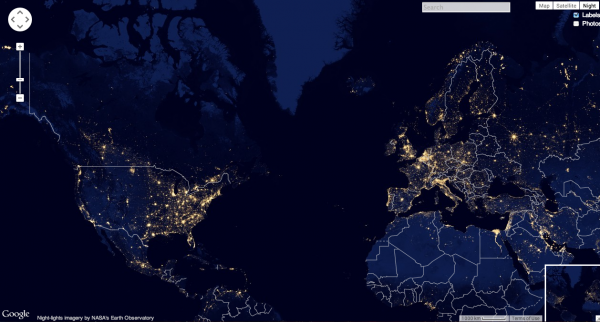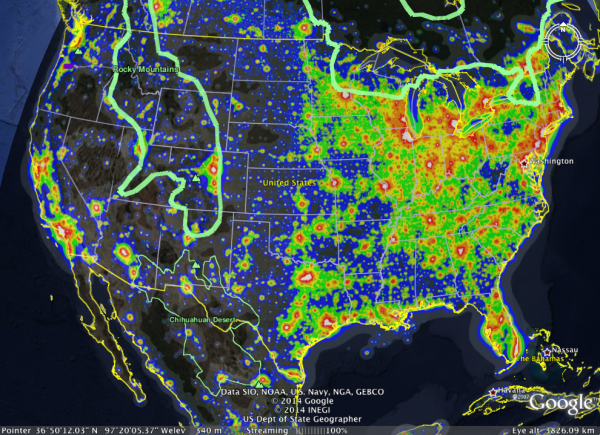“Every moment of light and dark is a miracle.” -Walt Whitman
To those of you who regularly enjoy clear, dark skies and the wondrous sights they bring, you have not only my envy, but the envy of a great many of us who long to have the wonders of the Universe directly accessible to our eyes. As the Jayhawks sing, you might be dreaming of
But the way our modern world works, humans tend to be clustered together in heavily light-polluted cities.
 Image credit: Google Maps / Blue Marble / NASA Earth Observatory, via http://www.blue-marble.de/nightlights/2012.
Image credit: Google Maps / Blue Marble / NASA Earth Observatory, via http://www.blue-marble.de/nightlights/2012.
But that doesn't mean that you couldn't enjoy a brilliantly dark sky -- at least, one that's much improved over your city nights -- with just a very brief journey! And you can plan that journey yourself with an interactive light-pollution map on your own computer; you'll be surprised at what improvements await you just an hour or two away from even the largest, most heavily light-polluted cities!
Go and check out how to do this for yourself, and enjoy the results no matter where you are!
- Log in to post comments


I currently live in the city and coming from a home situated in the middle of nowhere, the contrast of the two locations is vast. Living in the city is not only detrimental pertaining to noise pollution, but it is detrimental pertaining to the air pollution and light pollution! I was so used to seeing the sunset and the moonlight each night when I was still living with my parents, but now that does not happen any more. I read an article a while ago, based on pollution in Beijing. According to Liberty Voice, pollution in Beijing is so immense that there are no clear skies. Currently the Beijing government has actually been showing morning commuters a digital sunrise on electronic boards outside a region called the Tiananmen Square! The pollution is also detrimental to the citizens in the sense that there is lack of visibility on the highways. Chinese officials have closed four of some of the highways because of the lack of visibility on these highways. Air is dense and defiled, the skies are no longer clear. But how can we conserve the earth by plummeting the ever-rising hazardous levels of pollution?
Tough assignment. Right now I'm in Socorro NM, half an hour from the VLA on the Plains of San Augustin. From the front yard I can see Magdalena Ridge Observatory.
At night, walking a couple of blocks from the brewpub at the Plaza to home, I can look up and see the Milky Way.
Small towns in States that take dark skies seriously. Eat your hearts out.
As a sort of nyctophilliac (relative perspective) myself, I have really enjoyed this article in a way that it provides both a interesting as well as a scientific viewpoint on something that isn't considered to common knowledge. As inhuman as it may sound the afore mentioned light pollution provides me personally with more comfit than distress. I however, do not condone the way in which the system is fuelled, with that being said I must again reinforce my previous statement; whereby i feel that the overlay, although it may be perceived with negativity, brings about a sense of unity of people irrelevant of their geographic location. Oppositely though, I do feel that the level of light population has done no good for the perception people have for the beauty of nocturnal nature.
I've used this on-line Dark Sky Finder to locate good, dark locations in Michigan. http://www.jshine.net/astronomy/dark_sky/
Also, the International Dark Sky Association has sample lighting ordinances to reduce unnecessary light pollution by requiring light fixtures that light the ground, not the sky. http://darksky.org/outdoorlighting-29
Most city skies have become virtually empty of stars.
Light pollution is a side effect of industrial civilization., Light pollution is largely the result of bad lighting design, which allows artificial light to shine outward and upward into the sky, where it's not wanted, instead of focusing it downward, where it is.
Night lights disorient hatching sea turtles, migrating birds and nocturnal animals. Lights attract insects, which may in turn interfere with pollination of nocturnal flowers. Light pollution is increasing each year...
Aren't we all suppose to start taking dark skies seriously?
These instructions didn't work... any idea why the tif appear both far larger than the continent of North America and to its south?
Arlo, this is just a guess, but did you remember -- when you put in the numbers -- to put in the correct (and counterintuitive) letters? E.g., South: 9° 12' 39.03" N, East: 59° 25' 45.04" W?